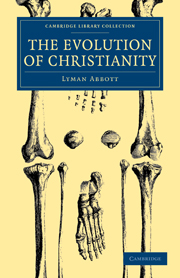Book contents
- Frontmatter
- Preface
- Contents
- CHAPTER I EVOLUTION AND RELIGION
- CHAPTER II THE EVOLUTION OF THE BIBLE
- CHAPTER III THE EVOLUTION OF THEOLOGY: THE OLD THEOLOGY
- CHAPTER IV THE EVOLUTION OF THEOLOGY: THE NEW THEOLOGY
- CHAPTER V THE EVOLUTION OF THE CHURCH
- CHAPTER VI THE EVOLUTION OF CHRISTIAN SOCIETY
- CHAPTER VII THE EVOLUTION OF THE SOUL
- CHAPTER VIII THE SECRET OF SPIRITUAL EVOLUTION
- CHAPTER IX CONCLUSION: THE CONSUMMATION OF SPIRITUAL EVOLUTION
CHAPTER VI - THE EVOLUTION OF CHRISTIAN SOCIETY
Published online by Cambridge University Press: 29 August 2010
- Frontmatter
- Preface
- Contents
- CHAPTER I EVOLUTION AND RELIGION
- CHAPTER II THE EVOLUTION OF THE BIBLE
- CHAPTER III THE EVOLUTION OF THEOLOGY: THE OLD THEOLOGY
- CHAPTER IV THE EVOLUTION OF THEOLOGY: THE NEW THEOLOGY
- CHAPTER V THE EVOLUTION OF THE CHURCH
- CHAPTER VI THE EVOLUTION OF CHRISTIAN SOCIETY
- CHAPTER VII THE EVOLUTION OF THE SOUL
- CHAPTER VIII THE SECRET OF SPIRITUAL EVOLUTION
- CHAPTER IX CONCLUSION: THE CONSUMMATION OF SPIRITUAL EVOLUTION
Summary
The first century of the Christian era was morally the darkest in history. The apparent splendor of the Roman Empire did not conceal from even its own thinkers the corruption which foretold approaching dissolution. The moral influences of the past seemed to have spent themselves, and no new power of righteousness had arisen for Rome's redemption. Government was an absolute despotism. Society was divided into two classes — many paupers and a few rich. Public corruption was not a public disgrace. Gluttony and drunkenness were fine arts, and licentiousness and prostitution a religion. The laborers were slaves; public education there was none; marriage was a partnership dissoluble at the will of either partner. In Palestine, also, there was decay, though yet not so complete. Thanks to the system of public education which Moses had founded, there was a parochial school for the children of the peasantry in every village that had a synagogue; thanks to the restrictions which Moses had put about slavery and polygamy, there were few or no slaves in Jewish households, and not a harem in all Palestine. And yet even in Palestine the church had fallen under the dominion of a corrupt and infidel priesthood, who were agnostics in their creed, though they were still ritualists in their practice.
At this time there appeared a young man of thirty whose brief life and simple teaching were to reconstruct the social order.
- Type
- Chapter
- Information
- The Evolution of Christianity , pp. 173 - 202Publisher: Cambridge University PressPrint publication year: 2009First published in: 1892

